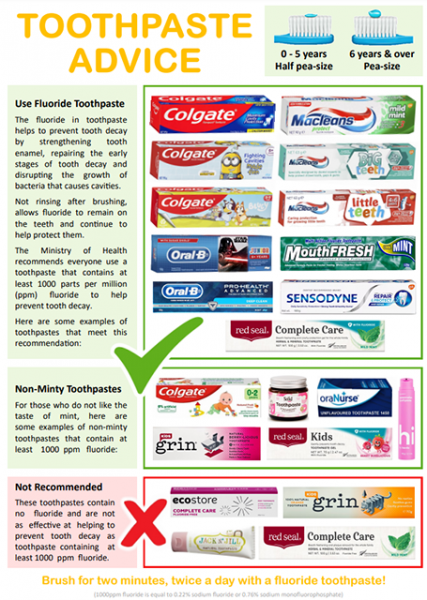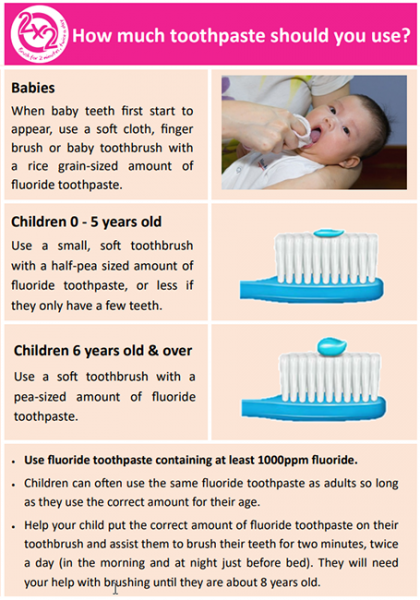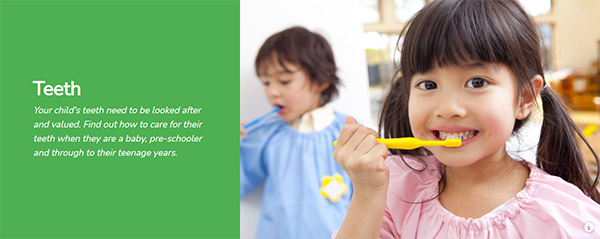Caring for Your Child’s Teeth: 5-18 years
Caring for Your Child’s Teeth: 5-18 years
Your child will start to lose their primary or baby teeth around the age of 6 and will have all their adult teeth (except for wisdom teeth) by the age of 14. Find out what to expect and how to care for their teeth.
Losing baby teeth
Your child's baby teeth will usually fall out by themselves, and permanent teeth will start to come through. This is a natural process - your child’s jaw will grow during this time, to make room for the permanent teeth.
Key things to know about losing baby teeth and new, permanent teeth:
- the first tooth to fall out is usually in the front of the lower jaw
- baby teeth will usually fall out by themselves
- if a new tooth can be seen before the baby tooth comes out, encourage your child to wiggle the baby tooth - if it takes more than 2 months to fall out or if your child is in pain, contact your child's local oral health service
- the first permanent molars come through at the back of the mouth between the ages of 6 and 7 - they do not replace baby teeth
- your child's baby teeth will continue to fall out until they are about 12 years of age
Find out more about caring for your baby's teeth
The teenage years
It is important your teenager looks after their teeth by brushing twice a day, eating healthy food, protecting them while playing sports and having regular dental check-ups.
Teeth straightening
Your child's dentist may recommend teeth straightening if they have crooked teeth or an abnormal bite.
Crowded and crooked teeth can cause problems, including tooth decay, gum disease and tooth loss.
A dentist or orthodontist will discuss with you the different ways to straighten your child's teeth and the cost involved.
Read more about orthodontic treatment.
Watch a video from the New Zealand Dental Council about orthodontic treatment
Wisdom teeth
Wisdom teeth are the teeth right at the back of the mouth and usually erupt between the ages of 17 and 25. Most people have four wisdom teeth - two at the top and two at the bottom.
Wisdom teeth can cause problems for some people if there is no room for them to come through. Your child’s dentist may recommend removing their wisdom teeth if this is the case.
Find out more about wisdom teeth.
How to look after your child's teeth
Follow these 6 steps to protect your child's teeth, and help them look after their own teeth:
- Brush teeth twice a day with a fluoride toothpaste.
- Have regular dental check-ups.
- Protect your child's teeth while playing sport.
- Check for signs of tooth decay (holes) once a month.
- Choose healthy snacks.
- Drink water or milk.
Brushing teeth
Tamariki will be able to start brushing their own teeth around the age of 8. A parent or caregiver will need to help them until then.
Important things to know for young tamariki:
If your child is too young to brush their own teeth, it might be easier to stand behind them and gently tilt their head back as you brush.
Use a small, soft brush with fluoride toothpaste twice a day. One brushing should be at night before they go to bed.
Use a half-pea size amount of toothpaste until about the age of 6 - your child should start using a pea-sized squirt of toothpaste from the age of 6.
You should brush your child's teeth - or they should brush themselves - for 2 minutes:
- all around the inside surfaces, where the teeth meet the gums, and also the top chewing surfaces
- on the front of the teeth, brushing in tiny circles all around the outside surfaces, close to the gums
- twice a day, including at night before they go to bed
Teach your child to spit out the left-over toothpaste after brushing. Don't rinse with water, because a small amount of fluoride toothpaste left around the teeth will help to protect them.
Check out which toothpaste to use, which ones to avoid, and how much to use (PDF, 5.5MB).
Regular dental check-ups
Oral healthcare is free for all children until they turn 18. Enrol your child with the service as early as possible, so you can arrange the first check-up. Regular check-ups of your child's teeth increase the chances of finding and treating any tooth decay (holes) early.
To enrol with a service or to make an appointment, phone 0800 TALK TEETH (0800 825 583). Your oral health therapist will tell you how often your child should have a check-up.
If your child accidentally bumps their teeth, take them to your local dentist, even if the teeth still look all right.
Find out more about dental care in New Zealand
Protect your child's teeth while playing sport
It is recommended your child wear a mouth guard when playing contact sports – this will protect their teeth and gums. A broken tooth is damaged for life.
If an adult tooth is knocked out, put it back in the socket if you can. If you can't, keep it moist by putting it in your child’s mouth next to their cheek or in a cup of milk and take the tooth and your child to their oral health professional as soon as possible as they may be able to save the tooth.
Check for decay
Gently lift your child's top lip once a month to check inside their mouth. It's a quick and easy way to see if tooth decay is present.
You can read about tooth decay and what to look for on the Plunket website.
See the New Zealand Dental Association’s advice on how to check for tooth decay (PDF page 2, 1.3MB).
Choose healthy snacks
Healthy eating = healthy teeth. To protect your child's teeth, give them low-sugar snacks between meals such as fruit, fresh vegetables, yoghurt and other dairy foods. Foods that are high in sugar can damage your child's teeth and cause tooth decay.
It's important to also give teeth a rest during the day, so keep snacks limited to just 2 to 3 times a day.
Check out the visual below on healthy snacks for healthy teeth (PDF, 8.8MB).
See more ideas on healthy snacks from Bee Healthy Regional Dental Service (PDF, 3MB).
Drink water or milk
The best drinks for your child's teeth are water and plain milk. Do not give your child drinks that have natural or added sugar, such as fruit juice, cordial, fizzy drinks, flavoured milks and chocolate drinks. These can cause tooth decay.
See more KidsHealth content on caring for your child's teeth
This page last reviewed 29 April 2022.
Do you have any feedback for KidsHealth?
If you have any feedback about the KidsHealth website, or have a suggestion for new content, please get in touch with us.
Email us now



